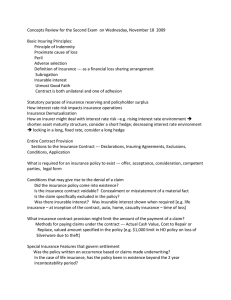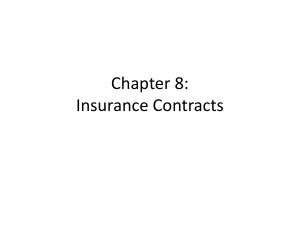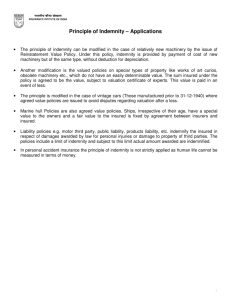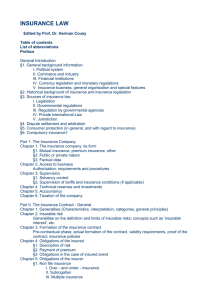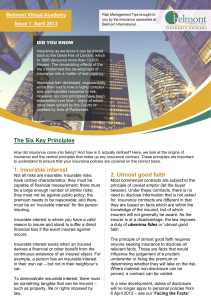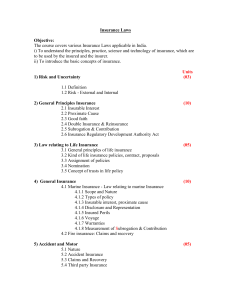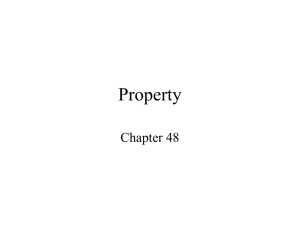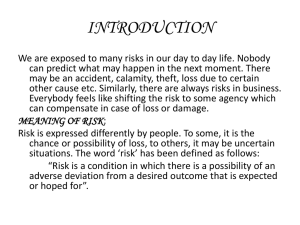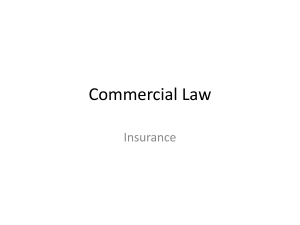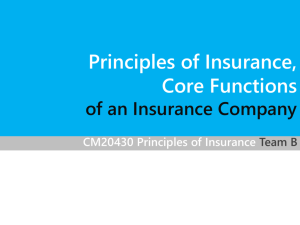Principles of Insurance
advertisement
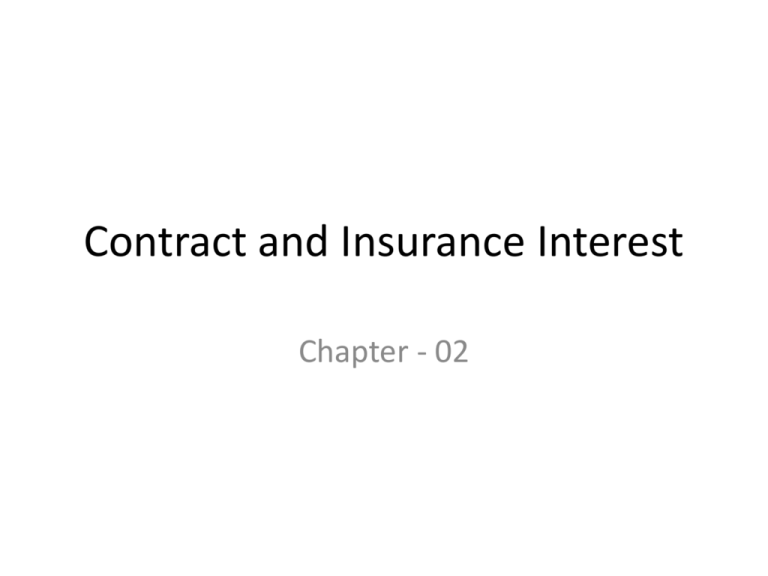
Contract and Insurance Interest Chapter - 02 Contract: A legally enforceable agreement. Contracts comprise promises or undertakings, usually given in exchange for a promise or undertaking from the other side: Therefore, an insurance policy in itself is not a contract; instead it is the most commonly used evidence of an insurance contract Elements or Essentials of a Contract 1 Void (or invalid) contracts: This means that the proposed contract does not exist in law; it is entirely without legal effect. In the context of insurance, the implication is that generally all premiums which have already been paid under a void contract (or invalid agreement) are returnable; so are claims paid. 2. Voidable contracts: A voidable contract is one that is apparently of legal effect and that remains to be legally effective unless and until an aggrieved party to the contract treats it as void as from contract conclusion within a reasonable time after acquiring knowledge of the availability of such a right of election. 3. Unenforceable contracts: This means what it says, an unenforceable contract cannot be enforced (or sued on) in a court of law. However, this is not because it is void, but because some required action has not been taken (e.g. stamp duty not paid on a lease of land, marine insurance policy not issued, etc. THE LAW OF AGENCY Agency is the relationship which exists between a Principal and his Agent. An agent in this context is a person who represents a principal. Insurance Agents (usually representing the insurer) or as Insurance Brokers (usually representing the insured/proposer) Duties Owed by Agent to Principal: (a) Obedience: The agent has to follow all lawful instructions of his principal, strictly or as best as is reasonably possible. (b) Personal performance: The agent is not allowed to delegate his authority and responsibilities to others (subagents) unless he has authority to do so. (c)Due care and skill: The law does not demand perfection, and an agent is normally only required to display all reasonably expected skills and diligence in performing his duties. (d)Loyalty and good faith: The agent’s obligations of loyalty and good faith are governed by several strict rules of law. (e)Accountability: The agent has to account for all moneys or other things he receives on behalf of his principal. He also has to keep adequate records relating to the agency activities Duties Owed by Principal to Agent (a) Remuneration: The agent is entitled to receive commission or other remuneration (such as bonus) as agreed. This the principal has to pay within a reasonable time or any specified time limit, as the case may be. (b) Expenses: The principal, subject to any express terms in the agency agreement, has to reimburse the agent for costs and expenses properly and reasonably incurred by the agent on behalf of the principal; e.g. legal defence expenses paid by a claims settling agent. (c) Breach of duty: The agent may take action against the principal for the latter’s breach of obligations to him. INSURABLE INTEREST • Insurable interest is a person’s legally recognised relationship to the subject matter of insurance that gives them the right to effect insurance on it. Since the relationship must be a legal one, a thief in possession of stolen goods does not have the right to insure them. Importance of Insurable Interest • An insurance agreement is void without insurable interest. The rules relating to return of premiums under such an agreement vary as between the different classes of insurance • Its Essential Criteria For insurable interest to exist, the following criteria must be satisfied: (a) there must be some person (i.e. life, limbs, etc.), property, liability or legal right (e.g. the right to repayment by a debtor) capable of being insured; (b) that person, etc. must be the subject matter of the insurance (that is to say, claim payment is made contingent on a mishap to such person, etc.); (c)the proposer must have the legally recognised relationship to the subject matter of insurance, mentioned in 3.1.1 above, so that financial loss may result to him if the insured event happens. How It Arises • Insurance of Interest :Everyone has an insurable interest in his own life, limbs, etc. One also has an insurable interest in the life of one's spouse. Further, one may insure the life of one's child or ward • Insurance of Property: The most obvious example arises in absolute ownership. Executors, administrators, trustees and mortgagees, who have less than absolute ownership, may respectively insure the estate, the trust property and the mortgaged property. • Insurance of Liability: Everyone facing potential legal liability for their own acts or omissions may effect insurance to cover this risk (sometimes insurance is compulsory), such liability being termed ‘direct liability’ or ‘primary liability’ Insurance of Legal Rights UTMOST GOOD FAITH Ordinary Good Faith: Meaning that the parties have to behave with honesty and such information as they supply must be substantially true. However, it is not their responsibility to ensure that the other party obtains all vital information which may affect his decision to enter into the contract, or may affect the terms on which he would enter into the contract. Utmost Good Faith: Insurance is subject to a more stringent common law principle of good faith, often called the principle of utmost good faith. It means that each party is under a duty to reveal all vital information (called material facts) to the other party, whether or not that other party asks for it Material Fact Every circumstance which would influence the judgment of a prudent insurer in fixing the premium, or determining whether he will accept the risk’. Facts that need not be disclosed: (i) Matters of common knowledge (e.g. the explosive character of hydrogen) (ii) Facts already known, or deemed to be known, to the insurer (e.g. the problem of piracy in Somalia); (iii) Facts which diminish the risk. [Example: A proposer for commercial fire insurance did not mention the fact that his premises were protected by an automatic sprinkler system Types of Breach of Utmost Good Faith (a) Fraudulent Misrepresentation: an act of fraudulently giving false material facts to the other party; (b) Non-fraudulent Misrepresentation: an act of giving false material facts to the other party done either innocently or negligently; (c) Fraudulent Non-disclosure: a fraudulent omission to give material facts to the other party; or (d) Non-fraudulent Non-disclosure: an omission to give material facts to the other party done either innocently or negligently INDEMNITY Indemnity means an exact financial compensation for an insured loss, no more no less. Implications: • Indemnity cannot apply to all types of insurance. Some types of insurance deal with ‘losses’ that cannot be measured precisely in financial terms. It is sometimes said that life and personal accident insurances involve benefit policies rather than policies of indemnity. How Indemnity is Provided (a) Cash payment (to the insured): This is the most convenient method, at least to the insurer. (b) Repair: Payment to a repairer is the norm, for example, with motor partial loss claims. (c) Replacement: With new items, or articles that suffer little or non depreciation, giving the insured a replacement item may be a very suitable method, especially if the insurer can obtain a discount from a supplier. (d) Reinstatement: This is a word that has a number of meanings in insurance. As a method of providing an indemnity, it means the restoration of the insured property to the condition it was in immediately before its
